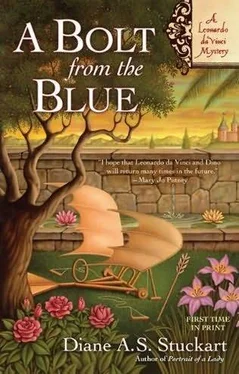Diane Stuckart - A Bolt from the Blue
Здесь есть возможность читать онлайн «Diane Stuckart - A Bolt from the Blue» весь текст электронной книги совершенно бесплатно (целиком полную версию без сокращений). В некоторых случаях можно слушать аудио, скачать через торрент в формате fb2 и присутствует краткое содержание. Год выпуска: 0101, Издательство: PENGUIN group, Жанр: Исторический детектив, на английском языке. Описание произведения, (предисловие) а так же отзывы посетителей доступны на портале библиотеки ЛибКат.
- Название:A Bolt from the Blue
- Автор:
- Издательство:PENGUIN group
- Жанр:
- Год:0101
- ISBN:нет данных
- Рейтинг книги:5 / 5. Голосов: 1
-
Избранное:Добавить в избранное
- Отзывы:
-
Ваша оценка:
- 100
- 1
- 2
- 3
- 4
- 5
A Bolt from the Blue: краткое содержание, описание и аннотация
Предлагаем к чтению аннотацию, описание, краткое содержание или предисловие (зависит от того, что написал сам автор книги «A Bolt from the Blue»). Если вы не нашли необходимую информацию о книге — напишите в комментариях, мы постараемся отыскать её.
A Bolt from the Blue — читать онлайн бесплатно полную книгу (весь текст) целиком
Ниже представлен текст книги, разбитый по страницам. Система сохранения места последней прочитанной страницы, позволяет с удобством читать онлайн бесплатно книгу «A Bolt from the Blue», без необходимости каждый раз заново искать на чём Вы остановились. Поставьте закладку, и сможете в любой момент перейти на страницу, на которой закончили чтение.
Интервал:
Закладка:
“But you may rest easy on one score,” came his solemn assurance as cries of disbelief met his words. “Know that your fellow apprentice died most bravely in defense of his master. And know, too, that I am both humbled and grieved by his sacrifice. . and that I would have taken the arrow in his stead, were it possible.”
“Master, we must avenge him!” came a shrill cry from behind me, rising over the muttered curses and muffled sobs that had begun to fill the room.
The speaker was Bernardo. The youngest of the apprentices, he could have modeled for the cherubs in any of the Master’s frescoes, with his round, pink face and halo of curly brown hair. Now, however, the soft curls trembled in rage, while the plump cheeks were dark with anger and dampened by tears.
“We must find the bandit who murdered Constantin and kill him ourselves,” he cried, shaking his fist. “Master, give me leave to go, and I shall search him out.”
“I’ll go with you,” Tommaso exclaimed, his beefy features tight with grief. “What of you, Paolo, and you, Tito. . and the rest of you? Will you not join us?”
Bold calls of agreement promptly rose from the others. Swept by that tide of emotion, I found myself clenching my own fist and vowing vengeance along with the rest. But as the clamor grew, Leonardo lifted a quelling hand.
“Your loyalty to the good Constantin is admirable,” he said, his stern gaze moving across the room until the cries settled to a few mutters, “but such a dangerous mission is a matter for Il Moro’s guard. A group of them left the castle soon after my return and now are scouring the countryside for the men that set upon us.”
His passing glance halted on me for a few seconds, and I caught the faintest of nods from him.
The gesture reassured me that the duke’s men were indeed combing the hills and tree-dotted plains around Milan. And while the brigands they sought were fictional, Constantin’s murderer was not and might be lurking somewhere beyond the castle walls. The soldiers would surely be on the alert for any suspicious person, no matter if he were dressed in a bandit’s rags or showed himself as my mysterious robed stranger.
To my surprise, Leonardo added, “But though the duke’s men are beyond the gates searching out this villain, that does not mean there might not be danger lurking here at the castle. Until this man is caught, I urge all of you to remain vigilant. Do not wander about the grounds alone, and keep a keen eye out for strangers.”
Had I not known the true circumstances of the day’s events, I might have been puzzled. And, indeed, a few apprentices glanced uncertainly at one another at these last instructions. The only question asked, however, was regarding the fate of our fallen friend.
“Master, what becomes of Constantin. . That is, shall he be buried here?”
This question came from Davide, one of the older apprentices. Blond and of wiry build and measured temperament, he was known as the workshop’s peacemaker, the one who stepped in to settle squabbles and mend torn friendships. He and Constantin had been close friends, I knew. And thus Davide’s words echoed with gravity far beyond his years, while his stricken expression reflected all of our grief.
Leonardo nodded. “Most of his family is either dead or living far away in the Greek isles,” he replied, “so there is no one to claim him other than us. He shall have a fine funeral and be laid in our churchyard tomorrow afternoon.”
He fell silent, and I saw reflected in his face the same grief that I had seen as he held the dying Constantin in his arms. Surely few masters cared for their apprentices as he did, I told myself, swiping fresh tears from my own eyes. Constantin had been equally devoted to him, which was why I knew that his last act could never have been one of betrayal. He had been running to Leonardo, and not simply fleeing someone else.
By now, several apprentices were gathered around the Master, listening to further words of comfort. The rest stood huddled together, exchanging words of praise for their dead friend. As I moved to join that second group, I noticed that, like I, Tito stood slightly apart from the others.
He chose that same moment to glance in my direction. Under the circumstances, I did not expect to see the usual casual smile he normally wore; still, something in his expression took me aback. For his pockmarked face reflected not so much grief as impatience, while his black eyes held anger rather than unshed tears. And though he and Constantin had not been the closest of friends, in recent days I had seen the pair together on numerous occasions.
Noting my scrutiny, Tito’s expression darkened, and for a moment he appeared to struggle with some inner emotion. Just as swiftly, he tossed his unruly black hair off his forehead and made his way toward where the Master stood.
I frowned as I joined the other huddled group of apprentices. Surely Tito must grieve Constantin’s loss as the rest of us did, I told myself as I linked arms with Vittorio and Paolo. Perhaps he simply was one of those people who embraced anger rather than sorrow under trying circumstances.
Soon after, the Master took his leave of us, with the admonition to finish our usual evening’s tasks before we settled in for the night. Under the circumstances, such a demand might have seemed unduly harsh. We all realized, however, that he sought to keep both our hands and our heads occupied while we attempted to reconcile ourselves to the tragedy that had happened in our midst.
Once the last paint pot was cleaned and the final broom tucked away, we gathered a bit uncertainly near the hearth, where the fire lay dying. It was usually Constantin who lit the night’s ration of candle stubs so that we might spend an hour of amusement before taking to our cots. No one appeared inclined to take on his role, just as none of us was disposed to indulge in merriment. Thus, it was with unspoken if mutual agreement that we put aside our usual ritual and retired early to bed.
Or, rather, the others did. I slipped out of the workshop and, shivering in the cool night air, made my way to Leonardo’s quarters in search of my father.
7
. such an instrument constructed by man is lacking in nothing except the life of the bird. .
— Leonardo da Vinci, Codex AtlanticusFor once, I was relieved to find that the Master was not within when I knocked upon his door. Where he would have gone, I could not guess, though I suspected his absence had something to do with the day’s events.
Instead, it was my father who ushered me inside. He’d been working at the Master’s table, for several candle stubs burned bright upon it. The model of the flying machine sat amid scattered papers where my father had recorded notes and measurements from the test flights he and the Master had carried out. Glancing at the pages, I noted in some surprise that his sheets bore a striking similarity to those in Leonardo’s notebooks. . save, of course, for the mirrored handwriting that was the Master’s alone.
My father gestured me toward the bench and took a seat beside me. I leaned against his shoulder, recalling Constantin’s mention of his father, and how he would have given ten years of his life to sit with his parent one more time.
Your wish has been granted, I thought, smiling mistily as I pictured the pair seated at some heavenly table and eagerly speaking of all that had happened since they last had seen each other in life.
My father must have heard my reflexive sigh, for he put a comforting arm around me.
“Your friend Constantin was a fine young man,” he remarked, “and a talented painter, as well. I am sorry that I did not have a chance to know him better, but I can tell you that your master spoke highly of him.”
Читать дальшеИнтервал:
Закладка:
Похожие книги на «A Bolt from the Blue»
Представляем Вашему вниманию похожие книги на «A Bolt from the Blue» списком для выбора. Мы отобрали схожую по названию и смыслу литературу в надежде предоставить читателям больше вариантов отыскать новые, интересные, ещё непрочитанные произведения.
Обсуждение, отзывы о книге «A Bolt from the Blue» и просто собственные мнения читателей. Оставьте ваши комментарии, напишите, что Вы думаете о произведении, его смысле или главных героях. Укажите что конкретно понравилось, а что нет, и почему Вы так считаете.












